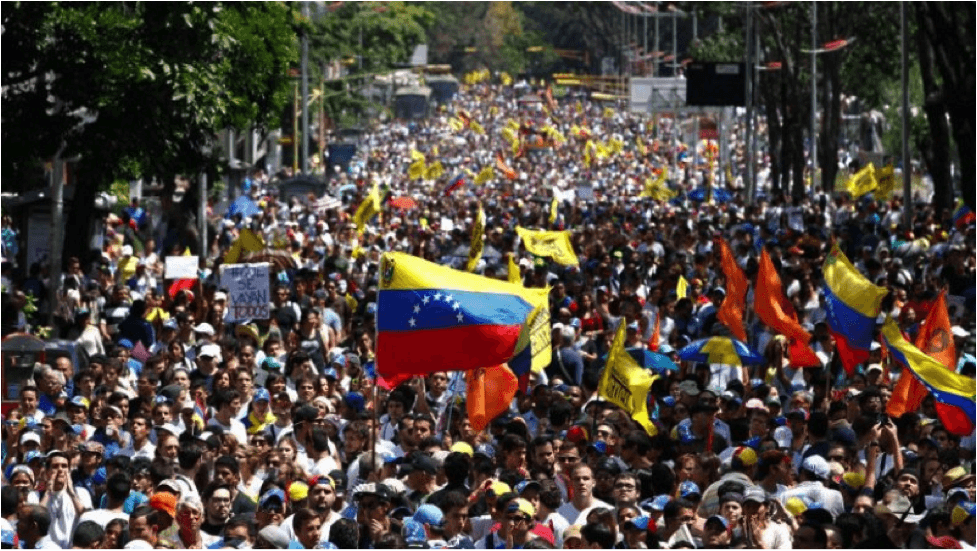
On February 12, multiple peaceful-turned-violent protests erupted in the major cities of Venezuela. These rallies conducted by university students have snowballed into a national conflict between the state and its citizens. The students were pacifically voicing their discontent against the government for the innumerable injustices currently plaguing Venezuela. The mandate to arrest these students turned highly controversial and thus incited the monumental manifestations, teeming with violence, that have taken place over the past few weeks. The nation’s president, Nicolas Maduro, commanded militarized police authorities to inhibit the protests, which has regrettably resulted in many injuries and deaths.
These incidents simply add further lines to the long list of mistreatments of citizens by the Venezuelan Government. Although international media has been scant as the crisis unfolds internally, manifestations and pleas for support have now reached a worldwide audience.
However, as we know there are always two sides of the story. Instead of addressing or planning to resolve the issues tormenting Venezuelan citizens, President Maduro’s tactics included a massive campaign to portray his government, at least attempt to, as victims of a conspiracy plan to overthrow their regime.
Venezuela’s public diplomacy abroad
This week, President Maduro’s administration began strategic movements to diffuse their two important messages: first, that information reaching international audiences regarding the situation in the country has been manipulated and exaggerated by media agents; second, to convince the international public’s opinion that the United States is partly to blame for the instability in the country due to their intervention with internal affairs through supporting the opposition.
These approaches have been used both domestically and internationally. Within Venezuela, it has been easier to manipulate due to the government’s ownership over the majority of communication outlets, and the immense oppression of information over private or international ones.
One of the main global venues used to broadcast these messages are Venezuelan embassies throughout the world; mostly through their social media pages. Additionally, just this week the Venezuelan Chancellor for external affairs, Elias Jaua, has commenced a global tour in search for support of the current government and more broadly the continuation of the Bolivarian Revolution.
Have their public outreach efforts been effective?
The problem with Venezuela’s credibility is the shocking and inspiring number of demonstrations taking place in the country, as well as the increasing momentum gathering world-wide denouncing the events and actions taken by the government. What is being protested against President Maduro’s administration transcends above local needs; citizens demand fundamental democratic principles.
For instance, 1) media repression and the current control of information and media outlets, 2) Oppressing freedom of assembly by using militarized security force against protesters, and 3) jailing his opponents such as the incarceration of opposition leader Leopoldo Lopez. These tactics, historically used by authoritarian regimes, have made it difficult for President Maduro to hide violations and defend his so-called democracy.
The social, political, and economic conditions in Venezuela are favorable to the development and continuation of large-scale protests and discontent with the government. However, it is the hope all Venezuelans to see their government actively working towards the amelioration of the country’s conditions, rather than actively seeking international approval and support of their 15-year failed socialist revolution.
The United States’ role
The structural conflict that has allowed for institutionalized state violence is due in part because all opposition groups or organization voicing the smallest criticism against the Venezuelan government are silenced, rebutted, punished, or censored by the government or its supporters. Thereunto, the United States government is indirectly forced to opt for ambiguous remarks and denunciations against Venezuela; carefully wording its discontent against the actions and the situation as a way to avoid accusations of “invading in internal affairs.”
Yet, even when President Obama’s administration is selective in its statements, Venezuela’s government will take any hint of criticism as a window of opportunity to rally up “anti-imperialistic” sentiments among its supporters and the region. For example on February 17, after U.S. Secretary of State John Kerry made his remarks about the situation evolving in Venezuela, President Maduro expelled three U.S. diplomats from the country, claiming they were associated with and supported the opposition’s plot. Evidently, the United States responded with the same method. It is worth reminding the reader that the countries have not exchanged ambassadors since 2010, proving the dire diplomatic relationships between the two governments.
The United States’ public diplomacy goals in this complicated situation should focus on defending its image among Venezuelans. Through this, the ultimate long term objective is the improvement of America’s reputation among Latin America’s left-wing countries.
Oriana Piña is a graduate student at the George Washington University pursuing a M.A. in Global Communications, with a concentration in Latin American Studies. She is passionate about democracy, diplomacy, cultural understanding and international affairs. Follow her at @OrianaIntl.



